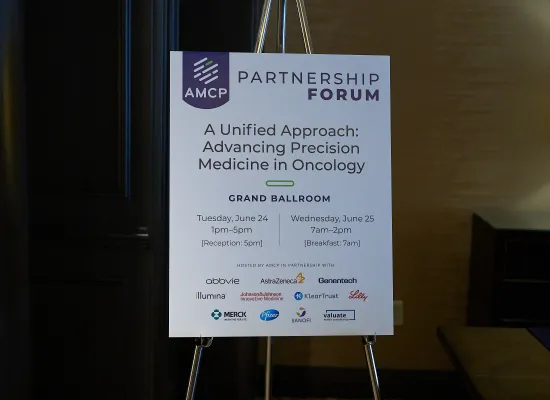
What’s Driving Managed Care Forward: A Data-Driven Look at AMCP’s AAO Report
Amid the noise of a crowded health care landscape full of opinions, data is key in discerning the nuanced insights that can truly support decisions. I’m a scientist myself—I know how important it is to analyze data with care and rigor. AMCP’s recently released 2024 Access, Affordability, and Outcomes (AAO) report does just that. It is and will be an immensely valuable tool for professionals across the managed care pharmacy industry as we work to give patients the best care at the best possible price.
The AAO report covers a wide breadth of topics. Just to name a few, it discusses the state of health insurance and prescription drug coverage, medication adherence within differing pharmacy networks, and strategies to control costs. And underpinning all of this is data showing how the tools and frameworks utilized by managed care pharmacists have a positive impact on patient lives. I wanted to take the time to go through some of these data points.
Role of employer-covered health insurance in drug affordability: The majority of Americans (54.3%) with private health insurance noted that prescription drugs are covered through their employer (found on page 10 of the report) and as a result, employers and groups representing them are an essential piece of the managed care landscape. With this in mind, managed care pharmacists have to make sure we’re keeping employers in mind when considering adjustments or tools to secure better patient results. Finding solutions that work with employers’ needs and wants will be key for managing outcomes, especially the affordability piece of this puzzle.
Prescription drug coverage yielding lower out-of-pocket costs: Unsurprisingly, those with health insurance, regardless of the type, have substantially lower out-of-pocket costs on their prescription drug coverage than those who are uninsured or purchasing their medications with cash. In fact, cash or uninsured patients paid $43.64 on average per prescription compared to $7.43, $6.17, and $0.26 for commercial, Medicare, and Medicaid averages, respectively, as seen on page 13 of the report. These averages illustrate the major financial burden facing uninsured patients or those who seek to purchase medication with cash.
Frameworks for delivering medications and their implications: Chronic medications dispensed with a 90-day supply have multiple positive benefits, as compared to prescriptions with only a 30-day supply, which you can refer to on page 29 of the report. A 90-day supply of medication is less costly for patients and health plans, and it leads to better patient adherence to chronic medications (especially if dispensed through mail-order pharmacies). In addition, our AAO analysis found that a larger portion of commercially insured patients were more adherent when receiving 90-day supplies from community pharmacies (71%) and mail-order pharmacies (83%) than they were if they received a 30-day supply from a community pharmacy (64%).
Moreover, 90-day supplies not only corresponded with better adherence to medications but also reduced costs. Specifically, of the top 15 brand and generic drugs prescribed in the U.S., prescriptions dispensed with 90-days’ supply saved commercial health plans 9% on brand products and 18% on generic products, compared to 30-days’ supply—as seen on page 28 of the report. Because of this, patients saved 23% on generic products and 32% on brand products under the same dispensing scenarios. Similarly, Medicare saved 2% on brand products and 19% on generic products for 90-day supply prescriptions, and Medicare beneficiaries saved 7% on brand products and 30% on generic products in out-of-pocket costs compared to a 30-day supply.
So much of the data shows us a path forward in how to better care for patients through sharper focus and stronger frameworks. If you haven’t yet read the whole report, I hope you’ll take some time to do so. It represents the best of what AMCP stands for and has to offer.
That being said, this is just a fraction of what AMCP does; we host countless workshops and convenings to move our industry forward. There’s the work that the Biologics & Biosimilars Collective Intelligence Consortium (BBCIC) does, focusing on generating scientific evidence on biologics and establishing a science-driven approach to using real-world data. There’s also the AMCP Research Institute, which encompasses all research facets of managed care pharmacy – from cost analyses to policy support, clinical care, and beyond. At its core, our work is better supported by the variety of perspectives we get from you.
So, if you’re not an AMCP member already, we’d love to have you join us!

Cate Lockhart, PharmD, PhD
Chief Science Officer, AMCP & Executive Director, BBCIC
Published on Dec. 16, 2024
Featured News & Resources
See Full CalendarAMCP eLearning Day: Nexus Encore
AMCP 2026 Registration Opens
Upcoming Events
AMCP offers a wide variety of educational opportunities, from events and webinars to online training.







